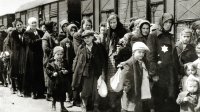The Importance of Teaching About the Holocaust
No matter the makeup of a school’s population, all students should have an opportunity to learn about the Holocaust.
Your content has been saved!
Go to My Saved Content.At a time when antisemitism has been especially visible in this country, I felt compelled to share my own experience as a Jewish teacher and the responsibility I felt to teach students about Jewish history, specifically the Holocaust.
Surrounded by History
Growing up, I never read Night, Number the Stars, or The Diary of Anne Frank. Not because I didn’t want to learn the stories of Jewish people who faced the gruesome realities of the Holocaust, but because I already knew them: I heard them from my grandparents, from my cousins, from the men and women in my community.
I grew up surrounded by the stories of Jewish people’s tragedies and triumphs. I never thought about the fact that these stories were so readily available to me. In my mind, these stories were universally told; I truly had never considered that people may not have a deep knowledge of the Holocaust, or even may not know what happened.
An Unsettling Experience
When I left my predominately Jewish community in New York and started teaching in New Orleans, I quickly realized that not only were my students unfamiliar with Jewish history and Jewish stories, but many were wholly unaware of what a Jewish person was.
It was genuinely unsettling to stand in front of a group of students with blank stares as I attempted to explain that I wouldn’t be celebrating Christmas over the winter break because I was Jewish. Students asked what that meant; they asked if it meant that I could speak another language or that I was from another country.
In New Orleans, there is a small, tightly knit Jewish community, but few members are present in the schools or native to the area. It was by no means the fault of these students, but Jewish stories simply hadn’t been brought into classrooms.
I am, always have been, and always will be, Jewish and had never before been forced to explain what that meant to me. It hurt that they didn’t know how hard Jewish people had fought to survive and still be here today.
In the moment, I did my best to start to share some of what being Jewish meant in my own experience, but even though I grew up surrounded by Jewish culture and practices, I had never before felt responsible to tell these stories. I wasn’t really sure how to do it on my own.
I recognize that many of my own students may have had a similar experience when faced with the burden of explaining their own histories as Black or other people of color. As their teacher, I have had the opportunity to learn from my students and elicit their stories in a safe classroom environment.
Even though I felt hurt by my students not understanding where I came from, it illuminated the opportunity not only to teach my students but also to learn from them. This goal of helping every person feel seen and valued in their individual or group history has continued to inform my work.
A More Inclusive History
Fast-forward one year, and I’m teaching in New York City, where lessons about the Holocaust are included in the curriculum. Students at Harlem Prep Middle School read both Night and The Diary of Anne Frank. They explored articles, videos, and interviews with Holocaust survivors as they built an understanding of what Jewish people had gone through at that time. Even though they didn’t have firsthand experience with Judaism, these students knew this history because the school actively created a curriculum to teach it.
As the only Jewish teacher on my grade-level team, I advocated for an opportunity to extend my students’ learning beyond just those core texts. I was given the opportunity to plan a field trip and take my students to the Museum of Jewish Heritage—A Living Memorial to the Holocaust. Before embarking on the trip, I presented my own family’s experiences in Nazi Germany and what being Jewish means to me today. My students had the chance to ask questions openly.
While every teacher may not have opportunities like I did to engage students in personal conversations about things like culture and religion, I hope that every teacher can understand the responsibility to teach about these things in a meaningful way. It should not be the responsibility only of Jewish teachers to teach students about the Holocaust and its lasting impacts.
Resources
Schools should actively seek out curricula, books, and other resources to bring these stories and the voices of Holocaust survivors into their classrooms, and teachers should hold their schools accountable to do so. The further we get from the Holocaust, the easier it could become to forget about these stories when there aren’t any survivors left to tell them; teachers have to be the ones to keep these stories alive and present for students, not only for Jewish students, but for all students.
I hope teachers feel empowered to seek out high-quality resources to bring these topics into their own classrooms. I have included a few below that can be a starting point to help introduce students to this piece of Jewish history.
